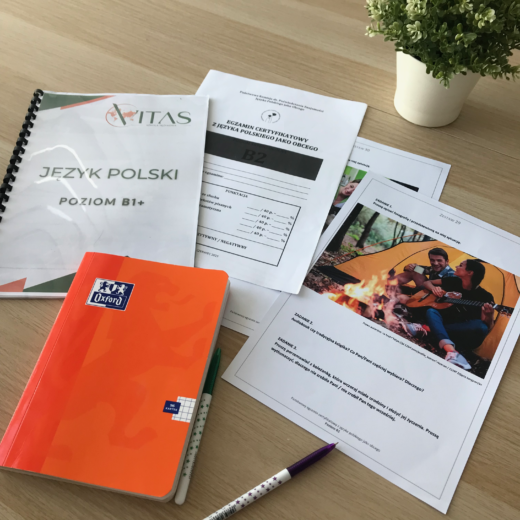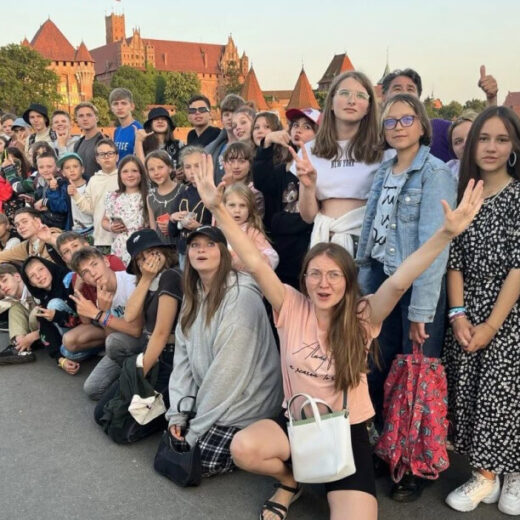
What Makes a Really Good Language Camp for Children and Teenagers?
Success in learning a foreign language often depends on the teachers we meet along the way. Love for the language, knowledge, charisma – all of these can ignite enthusiasm in students. Such teachers help children believe in their own abilities. The motivation and dedication of teachers are priceless – with their support, learning becomes a pleasure.
That’s why, when choosing a summer language camp for your child, it’s essential to check reviews about the teaching staff of the school or organisation running the camp.
Also, look at the camp programme: is language learning connected with various activities – excursions, artistic or sports programmes? Will children just sit at desks as in school, or will they be engaged in games and projects? Will they be encouraged to use the foreign language during these activities?
While reading about the camp, check whether a variety of teaching materials and language learning methods are used (e.g., audio, video, word games, karaoke).
Read participant reviews – they will show how organisers care about the atmosphere and individual needs of children and teenagers. When children feel comfortable and are interested in shared activities, they learn incredibly quickly!
Native Speakers – Real Language Immersion
A truly good language camp should include native speakers in addition to teachers who speak the native language of the participants. This is the key to true immersion! If the language is English, it’s worth checking whether they come from the UK. Sometimes organisers call people from former British colonies native speakers, which may result in a different accent and cultural experience than children might expect.
It’s also a good idea to ask how native speakers are selected to work with children. Ideally, they should be interesting, open individuals with rich personalities and life experience.
At high-quality camps, native speakers are people for whom teaching their language and sharing their culture is a mission. They often work in other fields (corporate, cultural institutions, etc.) and come to camps during their holidays to fulfil their dream of sharing what they know and love.
Imagine how wonderful it is to talk with interesting people from another country – it’s not just about vocabulary, but discovering culture, traditions, and everyday life first-hand. These relationships broaden children’s horizons and help them develop language skills more naturally.
They learn idioms, colloquial phrases, and local accents that make the language come alive.
Often, children stay in touch with native speakers long after the camp, continuing to use the foreign language in authentic contexts.
Tip from Vitas School: When choosing a language camp, ask if the Montessori method is used. We apply it both in our language school and on our trips. It helps children learn how to support others, express their needs, and cooperate. We also invite passionate guests from the UK who not only inspire love for the English language but also share their hobbies and interests.

Good Environment and Friendly Atmosphere – The Basis for Rest and Effective Learning
The camp location is very important. Sometimes, to save costs, organisers choose low-standard venues with poor and monotonous food. This can turn the trip into a nightmare. Yet it should be an adventure your child remembers all year long!
That’s why we always recommend reading reviews about the camp location – especially about the standards, cleanliness, food quality, safety, and closeness to nature.
A friendly atmosphere is also essential so the child can develop both language and social skills and return from the camp happy. Experienced educators play a key role – they create a safe environment where everyone feels free and motivated.
When caregivers encourage group integration, strong bonds form between participants. In this atmosphere, ideas and enthusiasm for shared fun and learning thrive.
Check whether the organisers plan interactive workshops or educational games as part of the camp. A language camp should be an opportunity for adventure, rest, and natural learning – much more engaging than what’s usually available at school.
Also, ask if time is wasted on long shopping trips to nearby stores. Parents invest significantly in these trips, so children should get plenty of activities and continuous exposure to the language – even during quieter evening hours, they should be gently encouraged to speak in the foreign language.
Group Projects – Learning in Practice
At truly great language camps, children usually work on a shared project throughout the camp, which is presented at the end. It could be a game, performance, film, or event.
During the project, children work under the guidance of teachers and are constantly encouraged to communicate in the foreign language. They are usually so absorbed in the process that they don’t notice how naturally they’re learning and remembering new expressions.
Working together, children discover their talents and bring something unique to the team.
Joint activities build strong relationships. And every project is a new adventure that brings unexpected outcomes and a lot of joy!
Tip from Vitas School: At our summer camps, children create different projects each year – from filming and editing a holiday movie to organising a sports day or a big entrepreneurial game. And all of it happens in English! It’s inspiring and educational at the same time.

Summary: Why Choose a Really Good Language Camp for Your Child?
In our opinion, when choosing a language camp, quality should be the priority. A child should feel safe, well cared for, and inspired. They should return with new skills, friends, great memories, and improved language confidence.
To achieve that, the elements described above must be in place. Let’s choose wisely – so this becomes a great investment in your child’s learning and well-being. May it be a truly good time for them!








